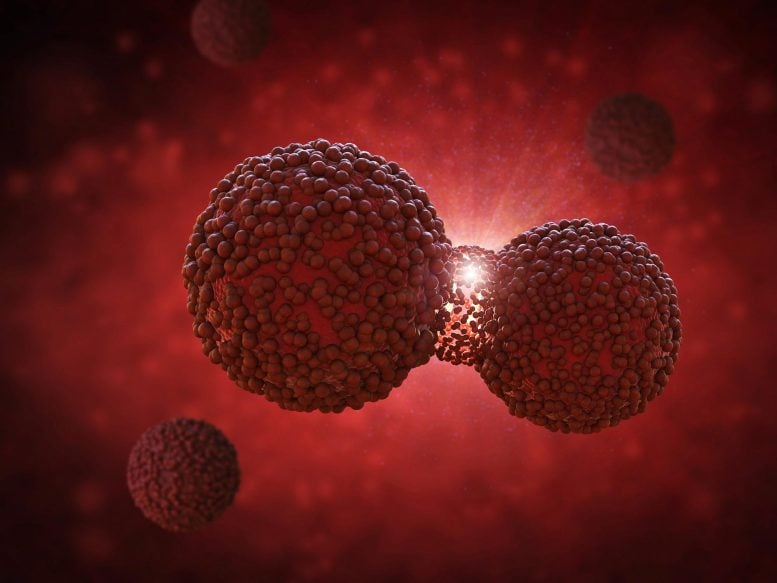
Scientists have recognized 618 proteins associated to 19 most cancers sorts, detectable over seven years earlier than most cancers prognosis. This breakthrough in proteomics could allow earlier detection and preventative remedy methods, shifting the main target from remedy to prevention. With over 300,000 most cancers instances analyzed, the analysis goals to develop focused therapies that might revolutionize most cancers care by specializing in the proteins that affect most cancers danger and improvement.
Two research funded by Most cancers Analysis UK and carried out by Oxford Inhabitants Well being have recognized blood proteins that might doubtlessly alert people to the presence of most cancers as much as seven years earlier than it’s recognized. Researchers pinpointed 618 proteins related to 19 totally different most cancers sorts, together with 107 proteins in people whose blood samples had been collected no less than seven years previous to their most cancers prognosis.
The crew has found that these proteins could possibly be concerned on the very earliest levels of most cancers, the place it could possibly be prevented.
They imagine that a few of these proteins could possibly be used to detect most cancers a lot sooner than is at present doable. Sooner or later, this might assist deal with the illness at a a lot earlier stage or stop it altogether.
Research Methodology and Preliminary Findings
Most cancers Analysis UK is funding researchers to search for the earliest indicators of most cancers as a part of its long-term technique to forestall most cancers by means of analysis. In these research, the crew used a strong method referred to as proteomics. Proteomics permits scientists to research a big set of proteins in tissue samples at a single time limit, to see how they work together with one another and discover any vital variations in proteins between totally different tissue samples.
Within the first examine, scientists analyzed blood samples from UK Biobank which had been taken from greater than 44,000 individuals, together with over 4,900 individuals who subsequently had a most cancers prognosis.
Utilizing proteomics, the crew analyzed a set of 1,463 proteins from a single pattern of blood from every individual. They in contrast the proteins of people that did and didn’t go on to be recognized with most cancers to search for vital variations between them and discover out which of them had been linked to most cancers danger. The scientists additionally recognized 182 proteins that differed within the blood three years earlier than a most cancers prognosis came about.
Within the second examine, the scientists checked out genetic knowledge from over 300,000 most cancers instances to do a deep dive into which blood proteins had been concerned in most cancers improvement and could possibly be focused by new remedies.
The scientists discovered 40 proteins within the blood that influenced somebody’s danger of getting 9 several types of most cancers. Whereas altering these proteins could improve or lower the possibilities of somebody growing most cancers, the scientists additionally discovered that in some instances this will result in unintended side-effects.
Nonetheless, the crew harassed that they might want to do additional analysis to search out out the precise position these proteins play in most cancers improvement, which of the proteins are essentially the most dependable ones to check for, what checks could possibly be developed to detect the proteins within the clinic and which medicine might goal these proteins.
Professional Opinions and Future Instructions
Dr. Keren Papier, Senior Dietary Epidemiologist at Oxford Inhabitants Well being and joint first writer of the primary examine, mentioned: “To save lots of extra lives from most cancers, we have to higher perceive what occurs on the earliest levels of the illness. Information from 1000’s of individuals with most cancers has revealed actually thrilling insights into how the proteins in our blood can have an effect on our danger of most cancers. Now we have to examine these proteins in depth to see which of them could possibly be reliably used for prevention.”
Dr. Joshua Atkins, Senior Genomic Epidemiologist at Oxford Inhabitants Well being and joint first writer of the primary examine, mentioned: “The genes we’re born with, and the proteins constituted of them, are vastly influential in how most cancers begins and grows. Because of the 1000’s of people that gave blood samples to UK BioBank, we’re constructing a way more complete image of how genes affect most cancers improvement over a few years.”
Dr Karl Smith-Byrne, Senior Molecular Epidemiologist at Oxford Inhabitants Well being and a senior writer of the primary paper and first writer of the second examine, mentioned: “We have predicted how the physique may reply to medicine that concentrate on particular proteins, together with many potential side-effects. Earlier than any scientific trials happen, now we have some early indications of which proteins we’d keep away from focusing on due to unintended unintended effects. This analysis brings us nearer to having the ability to stop most cancers with focused medicine – as soon as thought not possible however now rather more attainable.”
Professor Ruth Travis, Senior Molecular Epidemiologist at Oxford Inhabitants Well being and a senior writer of each research, mentioned: “To have the ability to stop most cancers, we have to perceive the elements driving the earliest levels of its improvement. These research are vital as a result of they supply many new clues in regards to the causes and biology of a number of cancers, together with insights into what’s occurring years earlier than a most cancers is recognized. We now have know-how that may have a look at 1000’s of proteins throughout 1000’s of most cancers instances, figuring out which proteins have a job within the improvement of particular cancers, and which could have results which might be widespread to a number of most cancers sorts.”
Government Director of Analysis and Innovation at Most cancers Analysis UK, Dr Iain Foulkes, mentioned: “Stopping most cancers means searching for the earliest warning indicators of the illness. Which means intensive, painstaking analysis to search out the molecular indicators we must always pay closest consideration to. Discoveries from this analysis are the essential first step in the direction of providing preventative therapies which is the final word route for giving individuals longer, higher lives, free from the worry of most cancers.”
References: “Figuring out proteomic danger elements for most cancers utilizing potential and exome analyses of 1463 circulating proteins and danger of 19 cancers within the UK Biobank” by Keren Papier, Joshua R. Atkins, Tammy YN Tong, Kezia Gaitskell, Trishna Desai, Chibuzor F. Ogamba, Mahboubeh Parsaeian, Gillian Ok. Reeves, Ian G. Mills, Tim J. Key, Karl Smith-Byrne and Ruth C. Travis, 15 Could 2024, Nature Communications,
DOI: 10.1038/s41467-024-48017-6
“Figuring out therapeutic targets for most cancers amongst 2074 circulating proteins and danger of 9 cancers” by Karl Smith-Byrne, Åsa Hedman, Marios Dimitriou, Trishna Desai, Alexandr V. Sokolov, Helgi B. Schioth, Mine Koprulu, Maik Pietzner, Claudia Langenberg, Joshua Atkins, Ricardo Cortez Penha, James McKay, Paul Brennan, Sirui Zhou, Brent J. Richards, James Yarmolinsky, Richard M. Martin, Joana Borlido, Xinmeng J. Mu, Adam Butterworth, Xia Shen, Jim Wilson, Themistocles L. Assimes, Rayjean J. Hung, Christopher Amos, Mark Purdue, Nathaniel Rothman, Stephen Chanock, Ruth C. Travis, Mattias Johansson and Anders Mälarstig, 29 April 2024, Nature Communications,
DOI: 10.1038/s41467-024-46834-3
The analysis was funded by Most cancers Analysis UK.






